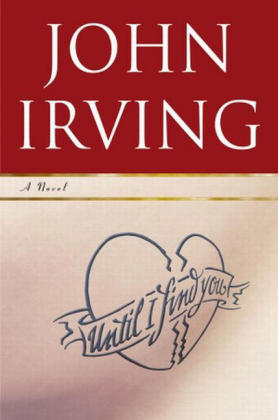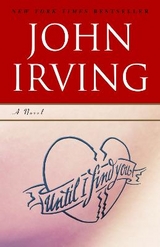
Until I Find You
Ballantine (Verlag)
978-0-345-49230-2 (ISBN)
- Titel erscheint in neuer Auflage
- Artikel merken
Until I Find You is the story of the actor Jack Burns - his life, loves, celebrity and astonishing search for the truth about his parents.
When he is four years old, Jack travels with his mother Alice, a tattoo artist, to several North Sea ports in search of his father, William Burns. From Copenhagen to Amsterdam, William, a brilliant church organist and profligate womanizer, is always a step ahead - has always just departed in a wave of scandal, with a new tattoo somewhere on his body from a local master or "scratcher."
Alice and Jack abandon their quest, and Jack is educated at schools in Canada and New England - including, tellingly, a girls' school in Toronto. His real education consists of his relationships with older women - from Emma Oastler, who initiates him into erotic life, to the girls of St. Hilda's, with whom he first appears on stage, to the abusive Mrs. Machado, whom he first meets when sent to learn wrestling at a local gym.
Too much happens in this expansive, eventful novel to possibly summarize it all. Emma and Jack move to Los Angeles, where Emma becomes a successful novelist and Jack a promising actor. A host of eccentric minor characters memorably come and go, including Jack's hilariously confused teacher the Wurtz; Michelle Maher, the girlfriend he will never forget; and a precocious child Jack finds in the back of an Audi in a restaurant parking lot. We learn about tattoo addiction and movie cross-dressing, "sleeping in the needles" and the cure for cauliflower ears. And John Irving renders his protagonist's unusual rise through Hollywood with the same vivid detail and range of emotions he gives to the organ music Jack hears as a child in European churches. This is an absorbing and moving book about obsession and loss, truth and storytelling, the signs we carry on us and inside us, the traces we can't get rid of.
Jack has always lived in the shadow of his absent father. But as he grows older - and when his mother dies - he starts to doubt the portrait of his father's character she painted for him when he was a child. This is the cue for a second journey around Europe in search of his father, from Edinburgh to Switzerland, towards a conclusion of great emotional force.
A melancholy tale of deception, Until I Find You is also a swaggering comic novel, a giant tapestry of life's hopes. It is a masterpiece to compare with John Irving's great novels, and restates the author's claim to be considered the most glorious, comic, moving novelist at work today.
From the Hardcover edition.
John (Winslow) Irving, geboren am 2. März 1942 in Exeter, im Staat New Hampshire, als ältestes von vier Kindern. John Irvings Vater war Lehrer und Spezialist für russische Geschichte und Literatur. Seine Kindheit verbrachte Irving in Neuengland. 1957 begann er mit dem Ringen; 19jährig wusste Irving, was er werden wollte: Ringer und Romancier. Studium der englischen Literatur an den Universitäten von New Hampshire und Iowa, wo er später Gastdozent des Schriftsteller-Workshops war. Deutschkurs in Harvard. 1963-1964 Aufenthalt in Wien. 1964 Rückkehr in die Vereinigten Staaten. Arbeit als Lehrer an Schule und Universität bis 1979. Lebt heute in Toronto und im südlichen Vermont. 1992 wurde Irving in die National Wrestling Hall of Fame in Stillwater, Oklahoma, aufgenommen, 2000 erhielt er einen Oscar für die beste Drehbuchadaption für seinen von Lasse Hallström verfilmten Roman Gottes Werk und Teufels Beitrag.
"As ever, Irving is at his best with the family relationships he creates. They are simultaneously touching and infuriating. It is with these relationships that Irving firmly grasps universal truths and puts a chokehold on his readers.... Irving's descriptions are distressing to read, but they force the reader to relate to the characters in a way they would not in most works of fiction."
- Calgary Herald
"Bittersweet . . . moving."
- People
" Until I Find You . . . cuts closer to the bone than any of [Irving's] previous works."
- Ottawa Citizen
Praise for John Irving:
John Irving has received awards from the Rockefeller Foundation, the National Endowment for the Arts and the Guggenheim Foundation; he has won an O. Henry Award, a National Book Award and an Oscar.
"Irving's novels are perceptive and precise reflections of the world around us."
- The Washington Post Book World
"John Irving is one of the very finest writers alive today."
- The Associated Press
"A serious artist of remarkable powers."
- Chicago Sun-Times
"Irving's popularity is not hard to understand. His world is really the world according to nearly everyone."
- Time
"A premier storyteller, master of the tragicomic and among the first rank of contemporary novelists."
- Los Angeles Times Book Review
"[Irving's] instincts are so basically sound, his talent for storytelling so bright and strong that he gets down to the truth of his time.
- The New York Times Book Review
"John Irving is a writer of prodigious talent."
- Calgary Herald
" John Irving is devoted to his people and his plots in a way that makes him unique among the most popular and widely read of the living American novelists. He has become his generation's Dickens."
- NOW Magazine
"He is among the very best storytellers at work today. At the base of Irving's own moral concerns is a rare and lasting regard for human kindness."
- The Philadelphia Inquirer
Praise for The Fourth Hand :
"A rich and deeply moving tale. . .Vintage Irving: A story of two very disparate people, and the strange ways we grow. . . . Irving's novels are perceptive and precise reflections of the world around us."
- The Washington Post Book World
"Using comedy, satiric social commentary and his adroit ability to tell a good yarn, Irving proffers a sweet love story with the very serious underlying theme of human transformation."
- Ottawa Citizen
"John Irving is one of the very finest writers alive today."
- The Associated Press
From the Hardcover edition.
Chapter 1 In the Care of Churchgoers and Old Girls According to his mother, Jack Burns was an actor before he was an actor, but Jack's most vivid memories of childhood were those moments when he felt compelled to hold his mother's hand. He wasn't acting then. Of course we don't remember much until we're four or five years old - and what we remember at that early age is very selective or incomplete, or even false. What Jack recalled as the first time he felt the need to reach for his mom's hand was probably the hundredth or two hundredth time. Preschool tests revealed that Jack Burns had a vocabulary beyond his years, which is not uncommon among only children accustomed to adult conversation - especially only children of single parents. But of greater significance, according to the tests, was Jack's capacity for consecutive memory, which, when he was three, was comparable to that of a nine-year-old. At four, his retention of detail and understanding of linear time were equal to an eleven-year-old's. (The details included, but were not limited to, such trivia as articles of clothing and the names of streets.) These test results were bewildering to Jack's mother, Alice, who considered him to be an inattentive child; in her view, Jack's propensity for daydreaming made him immature for his age. Nevertheless, in the fall of 1969, when Jack was four and had not yet started kindergarten, his mother walked with him to the corner of Pickthall and Hutchings Hill Road in Forest Hill, which was a nice neighborhood in Toronto. They were waiting for school to be let out, Alice explained, so that Jack could see the girls. St. Hilda's was then called "a church school for girls," from kindergarten through grade thirteen - at that time still in existence, in Canada - and Jack's mother had decided that this was where Jack would begin his schooling, although he was a boy. She waited to tell him of her decision until the main doors of the school opened, as if to greet them, and the girls streamed through in varying degrees of sullenness and exultation and prettiness and slouching disarray. "Next year," Alice announced, "St. Hilda's is going to admit boys. Only a very few boys, and only up to grade four." Jack couldn't move; he could barely breathe. Girls were passing him on all sides, some of them big and noisy, all of them in uniforms in those colors Jack Burns later came to believe he would wear to his grave - gray and maroon. The girls wore gray sweaters or maroon blazers over their white middy blouses. "They're going to admit you," Jack's mother told him. "I'm arranging it." "How?" he asked. "I'm still figuring that out," Alice replied. The girls wore gray pleated skirts with gray kneesocks, which Canadians called "knee-highs." It was Jack's first look at all those bare legs. He didn't yet understand how the girls were driven by some interior unrest to push their socks down to their ankles, or at least below their calves - despite the school rule that knee-highs should be worn knee-high. Jack Burns further observed that the girls didn't see him standing there, or they looked right through him. But there was one - an older girl with womanly hips and breasts, and lips as full as Alice's. She locked onto Jack's eyes, as if she were powerless to avert her gaze. At the age of four, Jack wasn't sure if he was the one who couldn't look away from her, or if she was the one who was trapped and couldn't look away from him. Whichever the case, her expression was so knowing that she frightened him. Perhaps she had seen what Jack would look like as an older boy, or a grown man, and what she saw in him riveted her with longing and desperation. (Or with fear and degradation, Jack Burns would one day conclude, because this same older girl suddenly looked away.) Jack and his mom went on standing in the sea of girls, until the girls' rides had c
| Sprache | englisch |
|---|---|
| Maße | 106 x 174 mm |
| Gewicht | 405 g |
| Themenwelt | Literatur ► Zweisprachige Ausgaben ► Deutsch / Englisch |
| Schlagworte | Englisch; Romane/Erzählungen |
| ISBN-10 | 0-345-49230-7 / 0345492307 |
| ISBN-13 | 978-0-345-49230-2 / 9780345492302 |
| Zustand | Neuware |
| Haben Sie eine Frage zum Produkt? |
aus dem Bereich



